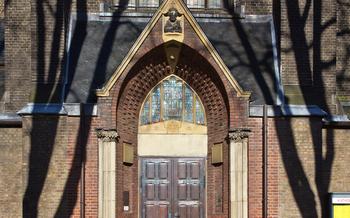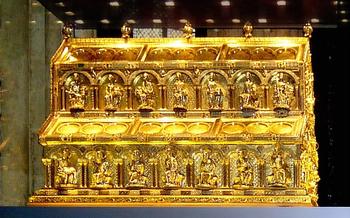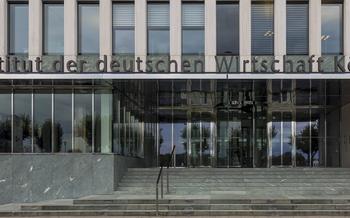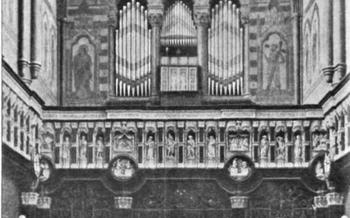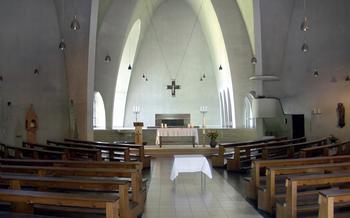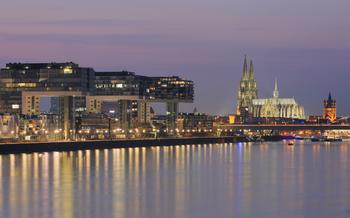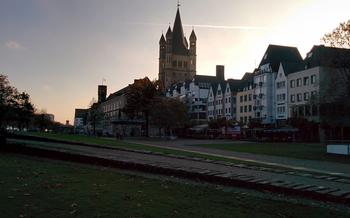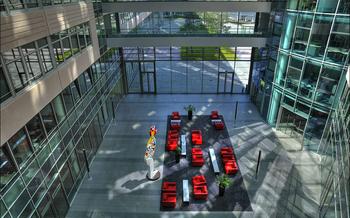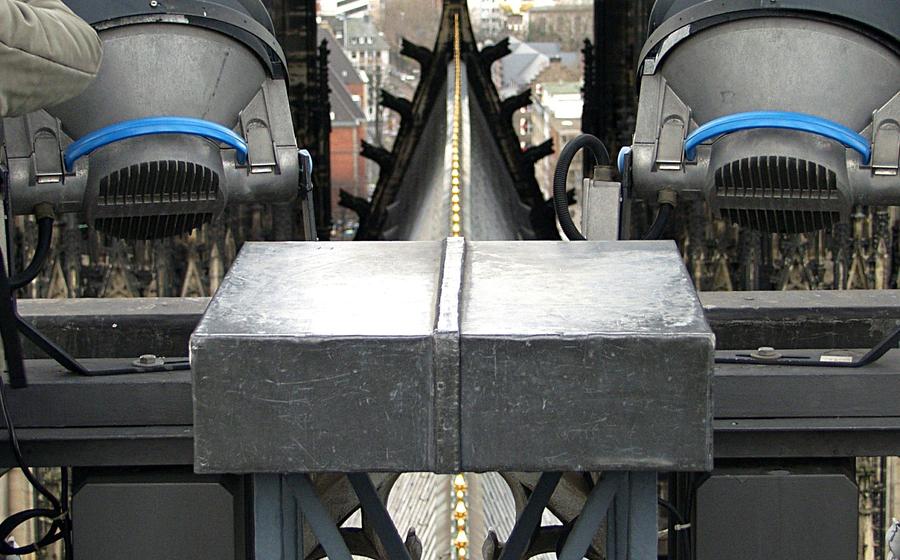
Cologne Cathedral (Kölner Dom)
- The Grandeur of Cologne Cathedral (Kölner Dom): A Gothic Masterpiece
- Exploring the Cathedral's Interior: A Realm of Art and Spirituality
- Climbing the Tower: A Panoramic Adventure
- Taking a Guided Tour: Unveiling Secrets and Stories
- Attending a Mass or Service: A Spiritual Encounter
- Contemplating the Cathedral's History: From Romanesque to Gothic
- Admiring the Treasury: A Showcase of Ecclesiastical Art
- Discovering the Cathedral Museum: A Journey Through History
- Exploring the Cathedral's Surroundings: A Tapestry of History and Culture
- Photography Tips for Capturing the Cathedral's Essence
- Accessibility and Visitor Information: Planning Your Visit
- Local Legends and Folklore Surrounding the Cathedral
- The Cathedral in Popular Culture: Art, Literature, and Film
- Insider Tip: Experiencing the Cathedral at Night
The Grandeur of Cologne Cathedral (Kölner Dom): A Gothic Masterpiece
History and significance of the cathedral
Cologne Cathedral, a magnificent edifice that stands as a testament to human ingenuity and faith, is a symbol of Germany's rich cultural heritage. Its construction began in 1248, and it took over 600 years to complete, showcasing the dedication and perseverance of generations of builders. As one of the largest Gothic cathedrals in Europe, it has served as a place of worship, pilgrimage, and awe for centuries, attracting millions of visitors from around the world.
Architectural highlights and its unique features
The cathedral's architectural style is a harmonious blend of Romanesque and Gothic elements, showcasing the transition from one era to another. Its distinctive twin towers, soaring to a height of 157 meters, dominate the Cologne skyline and offer breathtaking views of the city and the Rhine River. The intricate carvings, sculptures, and stained glass windows that adorn the cathedral's facade and interior are masterpieces of Gothic art, depicting biblical scenes and symbolizing the cathedral's religious significance.
Dimensions, construction, and restoration efforts
Cologne Cathedral is one of the largest cathedrals in the world, with a length of 144 meters and a width of 86 meters. Its construction involved meticulous craftsmanship and engineering techniques, using local materials such as basalt and trachyte. Over the centuries, the cathedral has undergone several restoration efforts, including a major reconstruction after World War II, preserving its grandeur and ensuring its continued existence for future generations.
The cathedral's role as a UNESCO World Heritage Site
In recognition of its outstanding universal value, Cologne Cathedral was designated a UNESCO World Heritage Site in 199This prestigious designation highlights the cathedral's historical, cultural, and architectural significance, placing it among the world's most treasured landmarks. The cathedral's inclusion on the UNESCO list ensures its protection and preservation for future generations.
Exploring the Cathedral's Interior: A Realm of Art and Spirituality
Venturing into the vast interior of Cologne Cathedral is like embarking on a spiritual journey through time and art. The awe-inspiring nave, with its soaring vaulted ceilings that seem to reach for the heavens, creates an atmosphere of reverence and wonder. Sunlight streaming through the magnificent stained glass windows casts a kaleidoscope of colors onto the stone pillars, illuminating the intricate carvings and sculptures that adorn every corner.
The stained glass windows, masterpieces of medieval craftsmanship, depict scenes from the Bible, narrating stories of faith, hope, and redemption. Each window tells a tale, inviting visitors to contemplate the lives of saints, prophets, and the teachings of Jesus Christ. The vibrant colors and intricate details of the glasswork create a sense of awe and inspiration, transforming the cathedral into a sacred space where art and spirituality converge.
At the heart of the cathedral lies the Shrine of the Three Kings, a magnificent golden reliquary that holds the remains of the biblical Magi who visited the infant Jesus. The shrine, adorned with precious stones, intricate carvings, and enamel work, is a testament to the cathedral's significance as a place of pilgrimage and devotion. Visitors from around the world come to pay homage to the Three Kings, seeking blessings and spiritual guidance.
In addition to the Shrine of the Three Kings, the cathedral's interior boasts a wealth of other significant artworks, altars, and sculptures. The high altar, with its elaborate carvings and gold leaf, is a masterpiece of Gothic art. The choir stalls, intricately carved with scenes from the life of Christ, offer a glimpse into the rich iconography of the medieval period. And the numerous sculptures, both large and small, depict a variety of saints, biblical figures, and mythical creatures, adding to the cathedral's visual splendor and spiritual depth.
Climbing the Tower: A Panoramic Adventure
Ascending the Cologne Cathedral's tower is a challenging yet rewarding experience that offers breathtaking panoramic views of the city and the surrounding region. The tower stands at an impressive height of 157 meters, making it one of the tallest church towers in the world. The climb consists of 533 steps, which can be physically demanding but is well worth the effort.
Once you reach the top, you'll be rewarded with stunning vistas that stretch for miles. The city of Cologne lies at your feet, with its charming streets, bridges, and the sparkling Rhine River meandering through it. On a clear day, you can even see as far as the Siebengebirge mountains, a picturesque range located to the east of the city.
The tower also houses a set of bells, which are among the largest in the world. The largest bell, known as "St. Peter," weighs an astonishing 24 tons and produces a deep, resonant sound that can be heard throughout the city. Visitors can learn about the history and significance of the bells during their ascent.
For those with limited mobility or who prefer a less strenuous experience, there is an elevator that can take you to the viewing platform, located at a height of 97 meters. From here, you can still enjoy impressive views of the city and the surrounding area.
Before embarking on your climb, be sure to check the weather forecast and dress appropriately. Also, keep in mind that the tower may be closed to visitors on certain days due to weather conditions or special events.
Taking a Guided Tour: Unveiling Secrets and Stories
Joining a guided tour of Cologne Cathedral is an enriching experience that unveils hidden secrets and captivating stories that bring the cathedral's history and significance to life. Knowledgeable guides lead visitors through the vast interior, pointing out intricate details, artistic masterpieces, and symbolic elements that might otherwise go unnoticed.
These tours delve into the cathedral's construction, restoration efforts, and controversies, providing insights into the challenges faced by its builders and the remarkable resilience it has shown over the centuries. Visitors can explore hidden corners, such as chapels and crypts, which offer a glimpse into the cathedral's rich past and spiritual heritage.
Personalized experiences and recommendations from guides enhance the tour, ensuring that visitors make the most of their visit. Guided tours are available in various languages, catering to international visitors and allowing everyone to appreciate the cathedral's grandeur and symbolism. Whether you're a history buff, an architecture enthusiast, or simply someone seeking a deeper connection with this iconic landmark, a guided tour is an invaluable way to discover the true essence of Cologne Cathedral.
Attending a Mass or Service: A Spiritual Encounter
Cologne Cathedral is not just a magnificent architectural marvel but also a sacred space that invites spiritual connection and reflection. Attending a mass or service within its hallowed walls is a profound experience that transcends mere sightseeing.
Stepping into the cathedral during a religious ceremony, visitors are enveloped in a palpable sense of reverence and tranquility. The soaring arches, intricate stained glass windows, and flickering candlelight create an awe-inspiring atmosphere that fosters contemplation and devotion.
Participating in the communal prayers, hymns, and readings, visitors can immerse themselves in the spiritual traditions and beliefs of the Catholic Church. The harmonious voices of the choir, the gentle ringing of bells, and the rhythmic sway of the congregation create a mesmerizing symphony that elevates the spirit.
For those seeking solace, peace, and inspiration, attending a mass or service at Cologne Cathedral can be a transformative experience. The sacred ambiance, coupled with the opportunity for quiet reflection and introspection, provides a sanctuary amidst the bustling city.
Whether one is a devout believer or simply seeking a spiritual connection, attending a mass or service at Cologne Cathedral is an enriching and unforgettable experience that offers a glimpse into the heart and soul of this magnificent edifice.
Contemplating the Cathedral's History: From Romanesque to Gothic
The Cologne Cathedral, a magnificent edifice that stands as a testament to centuries of architectural evolution, has its roots in the Romanesque style. Constructed in the 12th century, the eastern choir and transept exemplify this earlier phase, characterized by rounded arches, thick walls, and a sense of solidity. As the cathedral's construction progressed, a shift towards the Gothic style took place, driven by the influence of French master builders.
The nave, constructed in the 13th and 14th centuries, showcases the transition to Gothic architecture. Its soaring height, intricate rib vaults, and graceful pointed arches create a sense of lightness and elegance. The western facade, completed in the 19th century, epitomizes the High Gothic style, with its elaborate tracery, delicate pinnacles, and towering spires that reach towards the heavens.
The cathedral's history is a fascinating tapestry of architectural styles, reflecting the evolving tastes and techniques of different eras. From the solidity of Romanesque to the ethereal beauty of Gothic, the Cologne Cathedral stands as a testament to the enduring power of human creativity and the enduring legacy of religious devotion.
Admiring the Treasury: A Showcase of Ecclesiastical Art
The Cologne Cathedral treasury is a treasure trove of ecclesiastical art and artifacts, offering visitors a glimpse into the cathedral's rich history and religious significance. Among the highlights of the collection are exquisite reliquaries, intricately crafted goldsmith work, and ceremonial liturgical objects.
One of the most notable pieces is the Shrine of the Three Kings, a magnificent reliquary that holds the purported remains of the biblical Magi. Adorned with gold, jewels, and precious enamels, the shrine is a masterpiece of medieval craftsmanship and a testament to the cathedral's status as a pilgrimage site.
Another must-see item is the Gero Cross, a 10th-century crucifix carved from oak and covered in gold leaf. This remarkable work of art is one of the oldest surviving large-scale crucifixes in the world and is considered a masterpiece of Ottonian art.
The treasury also houses an impressive collection of liturgical objects, including chalices, monstrances, and pastoral staffs. These ornate and finely crafted items were used in religious ceremonies and processions, and provide insights into the rituals and practices of the medieval church.
Exploring the cathedral treasury is a unique opportunity to appreciate the artistic and spiritual heritage of Cologne Cathedral. Whether you are a history buff, an art enthusiast, or simply someone who appreciates beautiful objects, the treasury is a must-visit destination.
Discovering the Cathedral Museum: A Journey Through History
Adjacent to the Cologne Cathedral, the Cathedral Museum invites visitors on a journey through the history and cultural significance of this awe-inspiring edifice. Its collection of artifacts, exhibits, and multimedia presentations provides a deeper understanding of the cathedral's construction, restoration, and enduring legacy.
Through interactive displays and immersive experiences, the museum unveils the stories behind the cathedral's architectural evolution, from its Romanesque origins to its transformation into a Gothic masterpiece. Visitors can trace the cathedral's journey through the centuries, exploring the challenges and triumphs that shaped its final form.
The museum's collection includes fragments of the original Romanesque structure, intricate models depicting different stages of the cathedral's construction, and an array of sculptures, paintings, and liturgical objects that once adorned the cathedral's interior. These artifacts offer a glimpse into the artistic and spiritual traditions that influenced the cathedral's design and decoration.
A highlight of the museum is the "Sacred Treasury," which showcases a dazzling array of precious relics, reliquaries, and goldsmith work. These treasures, once used in religious ceremonies and processions, demonstrate the cathedral's immense wealth and devotion throughout the centuries.
The Cathedral Museum offers a unique perspective on the Cologne Cathedral, complementing the awe-inspiring experience of visiting the cathedral itself. It allows visitors to delve into the rich history, symbolism, and cultural significance of this architectural masterpiece, gaining a deeper appreciation for its enduring legacy as a symbol of faith, art, and human endeavor.
Exploring the Cathedral's Surroundings: A Tapestry of History and Culture
Beyond the awe-inspiring Cologne Cathedral, the surrounding area is a treasure trove of historical and cultural landmarks. The Old Town (Altstadt), located just a stone's throw from the cathedral, invites visitors to wander through its charming squares and streets, lined with colorful buildings, quaint shops, and traditional restaurants.
Delve into the depths of history at the Roman-Germanic Museum, which houses a remarkable collection of archaeological artifacts from the Roman and Germanic periods, providing insights into the city's ancient past.
For a refreshing change of scenery, stroll along the banks of the Rhine River, where scenic promenades offer breathtaking views of the cathedral and the city skyline. Take a leisurely boat trip to admire the cathedral from a unique perspective.
Discover other nearby attractions, such as the Ludwig Museum, showcasing a diverse collection of modern and contemporary art, or the Museum of Applied Art, which houses a fascinating array of decorative arts and design objects.
Explore the Church of St. Gereon, a 4th-century Romanesque basilica with a distinctive circular design, or visit the Wallraf-Richartz Museum, which boasts a collection of medieval to modern art.
Immerse yourself in the vibrant cultural scene by attending a concert at the Cologne Philharmonic, or catching a performance at the ** Schauspiel Köln, one of Germany's leading theaters.
Indulge in culinary delights at one of the many restaurants in the area, offering a range of cuisines from traditional German fare to international specialties.
Whether you are a history buff, art enthusiast, or simply seeking a delightful stroll, the surroundings of Cologne Cathedral offer a wealth of experiences to enrich your visit.
Photography Tips for Capturing the Cathedral's Essence
Cologne Cathedral's architectural grandeur and intricate details demand skillful photography to truly capture its essence. Here are some recommended tips for photographers seeking to immortalize this iconic landmark:
-
Camera Settings: Utilize a tripod for stability and set your camera to a low ISO to minimize noise. Choose a wide-angle lens to capture the cathedral's full height and grandeur. For interior shots, adjust your aperture to f/8 or higher to ensure sharp focus throughout the frame.
-
Angles and Vantage Points: Experiment with different angles to create dynamic compositions. Capture the cathedral from a low perspective to emphasize its towering presence. Utilize the surrounding bridges and streets to find unique vantage points that showcase the cathedral in relation to its urban context.
-
Natural Light and Weather Conditions: The interplay of light and shadow can dramatically enhance your photographs. Visit the cathedral at different times of the day to capture the changing light conditions. Overcast skies can provide even, diffused light, while golden hour offers warm, flattering tones.
-
Details, Interiors, and Surroundings: Don't just focus on the cathedral's exterior. Explore the interiors to capture the intricate stained glass windows, vaulted ceilings, and sculptures. Additionally, capture the surrounding Old Town, the Rhine River, and other landmarks to provide context and a sense of place.
Accessibility and Visitor Information: Planning Your Visit
Visiting Cologne Cathedral is an enriching and accessible experience for all. The cathedral offers various features to accommodate visitors with disabilities, ensuring an inclusive and enjoyable visit. Wheelchair ramps and elevators provide easy access to different levels of the cathedral, allowing everyone to explore its grandeur. Additionally, audio guides and tactile models are available for visually impaired visitors, enabling them to appreciate the cathedral's intricate details.
To plan your visit effectively, consider the cathedral's operating hours, which vary depending on the season and religious holidays. Ticket prices are reasonable, and guided tours are offered in multiple languages, providing in-depth insights into the cathedral's history and architecture. To avoid crowds and ensure a smooth visit, plan your visit during weekdays or opt for early morning or late afternoon hours.
Remember to dress respectfully when visiting the cathedral, as it is a place of worship and pilgrimage. Security checks are in place to ensure the safety of visitors and the cathedral's treasures. Various amenities, including restrooms, a gift shop, and a cafe, are available to enhance your visit. Embrace the opportunity to explore this magnificent cathedral, a testament to human ingenuity and spirituality, and create lasting memories of your time in Cologne.
Local Legends and Folklore Surrounding the Cathedral
The Cologne Cathedral is steeped in a rich tapestry of legends and folklore that have been passed down through generations. One of the most enduring tales is the story of the Three Kings, or Magi, who are said to be buried within the cathedral walls. According to legend, the remains of the Three Kings were brought to Cologne by the Holy Roman Emperor Frederick Barbarossa in the 12th century. The cathedral's Shrine of the Three Kings, an elaborate reliquary located behind the high altar, is believed to contain their remains. Each year, on January 6th, the Feast of the Epiphany, a grand procession takes place in Cologne to honor the Three Kings, attracting thousands of pilgrims and visitors.
Another popular legend associated with the cathedral is the story of the devil's bargain. It is said that the devil offered to help the builders of the cathedral complete their work in exchange for their souls. The builders agreed, but they cleverly tricked the devil by leaving a small gap in the cathedral's construction. The devil, unable to find a way to enter the cathedral, was forced to leave empty-handed. The gap, known as the "devil's hole," can still be seen on the cathedral's exterior.
The cathedral's bells also hold a special place in local folklore. Each bell has its own name and is associated with a different legend or story. The largest bell, known as "St. Peter," is said to have been cast from melted-down cannons captured from the French during the Napoleonic Wars. The sound of the bells ringing out over the city is a beloved tradition that evokes a sense of pride and community among the people of Cologne.
The Cathedral in Popular Culture: Art, Literature, and Film
The Cologne Cathedral has served as an enduring source of inspiration for artists, writers, and filmmakers throughout history. Its iconic silhouette and awe-inspiring grandeur have been captured in numerous paintings, sculptures, and works of literature. The cathedral's unique architectural features and its rich history have made it a popular backdrop for movies, TV shows, and documentaries.
In the realm of art, the cathedral has been immortalized in the works of renowned painters such as Gerhard Richter and Anselm Kiefer. Its intricate facade and soaring spires have been depicted in various styles and perspectives, each capturing the essence of the cathedral's majesty. Sculptors have also found inspiration in the cathedral's ornate details, creating sculptures that pay homage to its architectural wonders.
In literature, the Cologne Cathedral has been featured in novels, short stories, and poems. Its presence adds a layer of historical and cultural significance to the narratives, evoking a sense of awe and wonder in the readers. The cathedral's spiritual and symbolic dimensions have also been explored in literary works, delving into its role as a place of worship, pilgrimage, and contemplation.
The cathedral's cinematic appeal has made it a popular choice for filmmakers. It has been featured in movies such as "The Monuments Men" (2014), "The Chronicles of Narnia: The Lion, the Witch and the Wardrobe" (2005), and "Iron Sky" (2012). The cathedral's imposing presence and its historical significance add depth and authenticity to these cinematic productions.
Documentaries have also explored the cathedral's rich history, construction, and cultural significance. These documentaries provide viewers with an in-depth understanding of the cathedral's architectural marvels, its role in religious and cultural life, and its enduring legacy as a symbol of Cologne and Germany.
Insider Tip: Experiencing the Cathedral at Night
Cologne Cathedral takes on a new allure and enchantment when the sun sets. As darkness envelops the city, the cathedral's facade is dramatically illuminated, casting an ethereal glow that transforms the entire square. The intricate details of the carvings and sculptures are accentuated by the soft light, creating a breathtaking spectacle.
For photographers, the night offers a unique opportunity to capture the cathedral's magnificence in a different light. The long exposure times allow for creative and artistic shots, capturing the cathedral's grandeur against the starry sky. The reflections on the wet cobblestones add a touch of magic to the scene, making it a photographer's paradise.
Beyond photography, the cathedral at night offers a serene and spiritual ambiance. With fewer crowds, visitors can wander around the square, marveling at the cathedral's illuminated splendor. The soft glow of the stained glass windows casts a warm and inviting light, creating a sense of peace and tranquility.
Special events and light shows are often held at the cathedral during the evening, adding to its allure. These events showcase the cathedral's architectural features in a unique and captivating way, using projections, lasers, and music to create a mesmerizing spectacle.
Whether you're a photographer, a history enthusiast, or simply someone seeking a unique and awe-inspiring experience, visiting Cologne Cathedral at night is an absolute must. Its illuminated grandeur and serene atmosphere will leave you with lasting memories of this iconic landmark.
